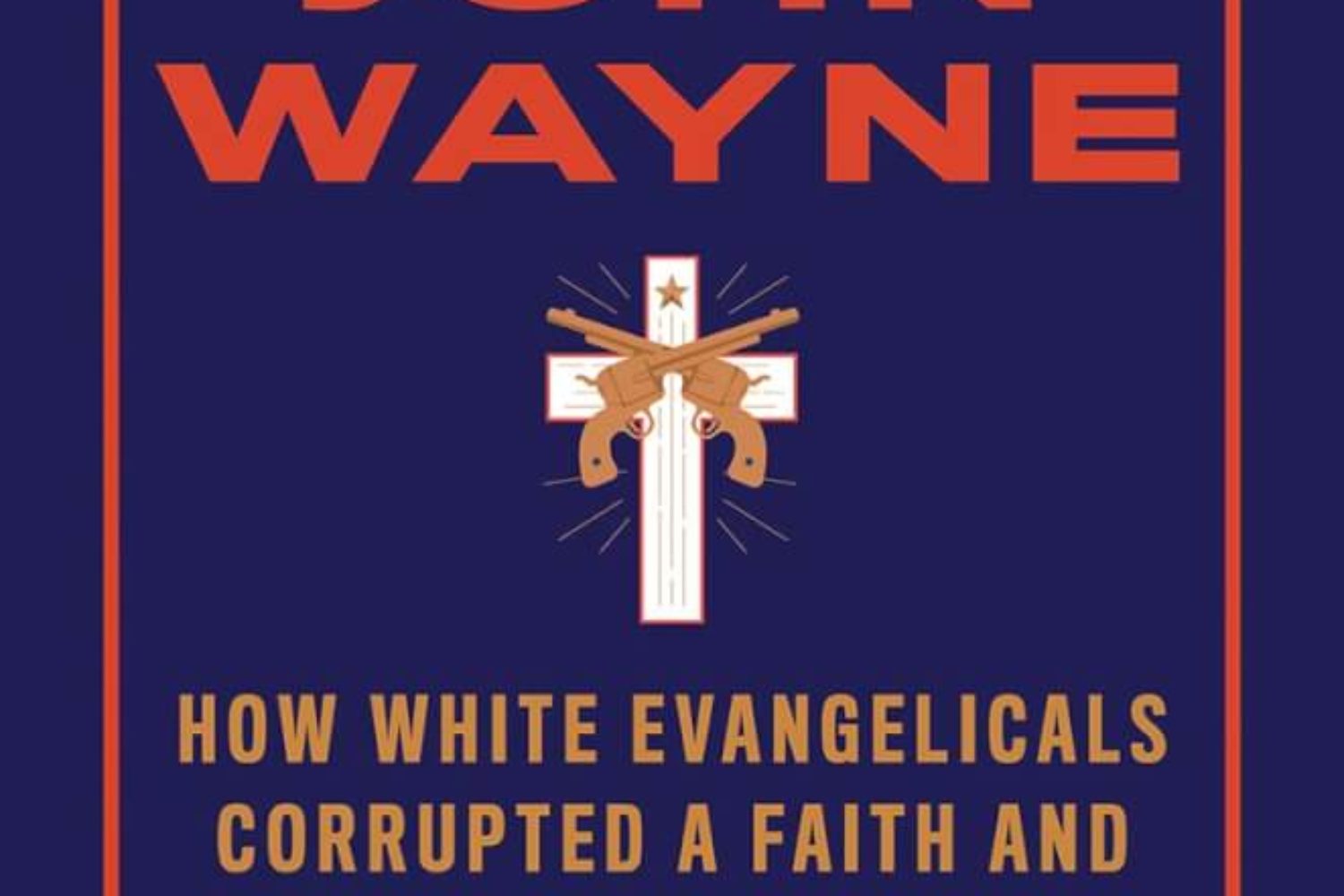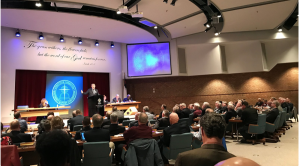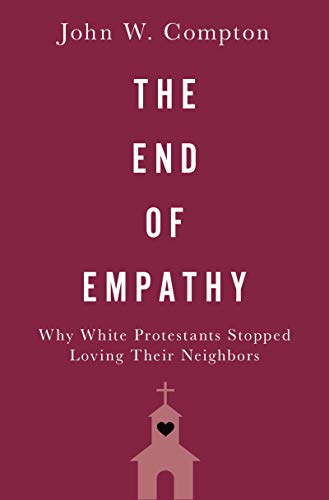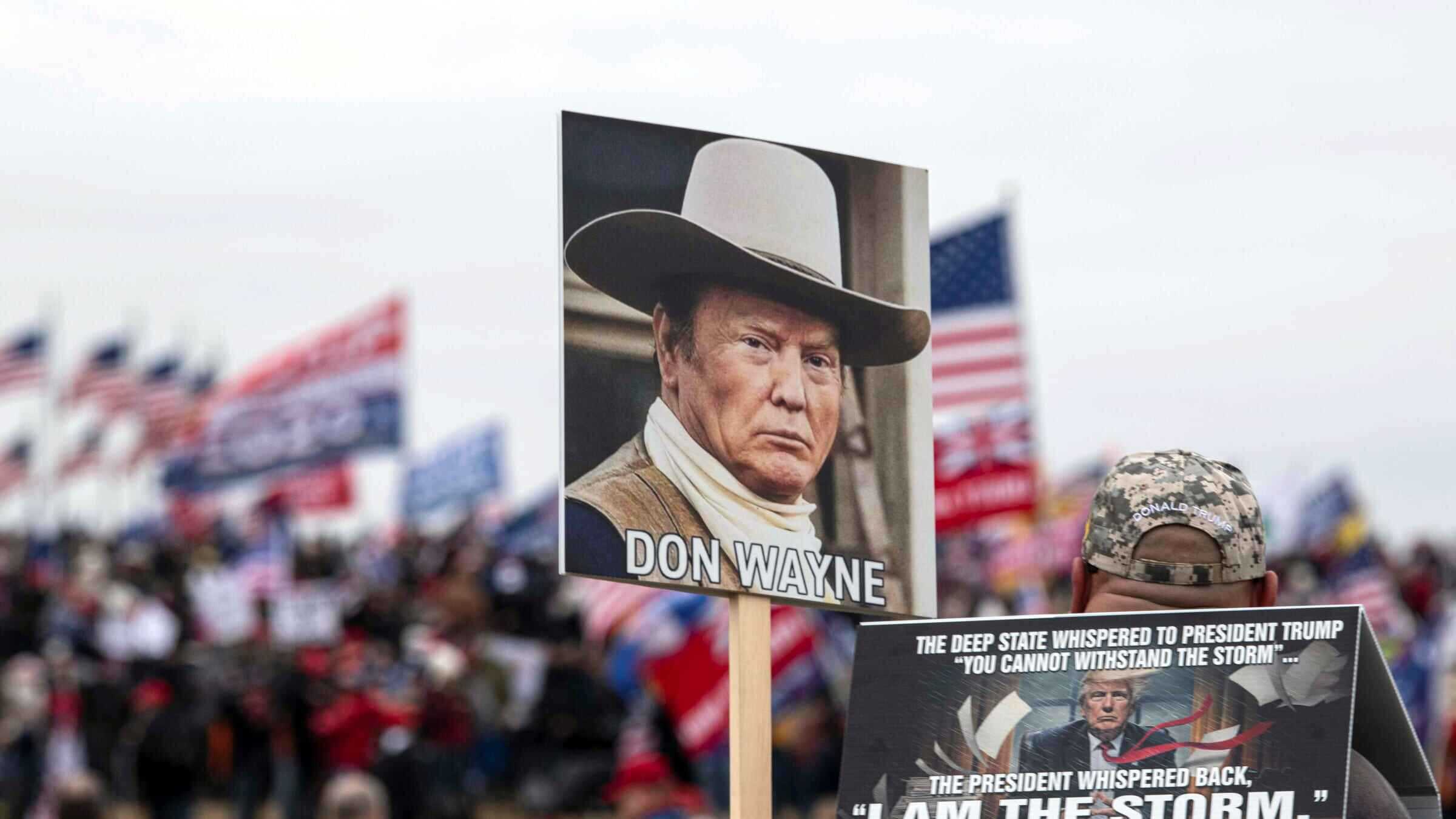Book Review of: Jesus and John Wayne: How White Evangelicals Corrupted a Faith and Fractured a Nation
Kristin Kobes Du Mez, Liveright Publishing Corporation, 2020, 356 pages
WN: This is one of the few times I also posted a book review to this Blog.
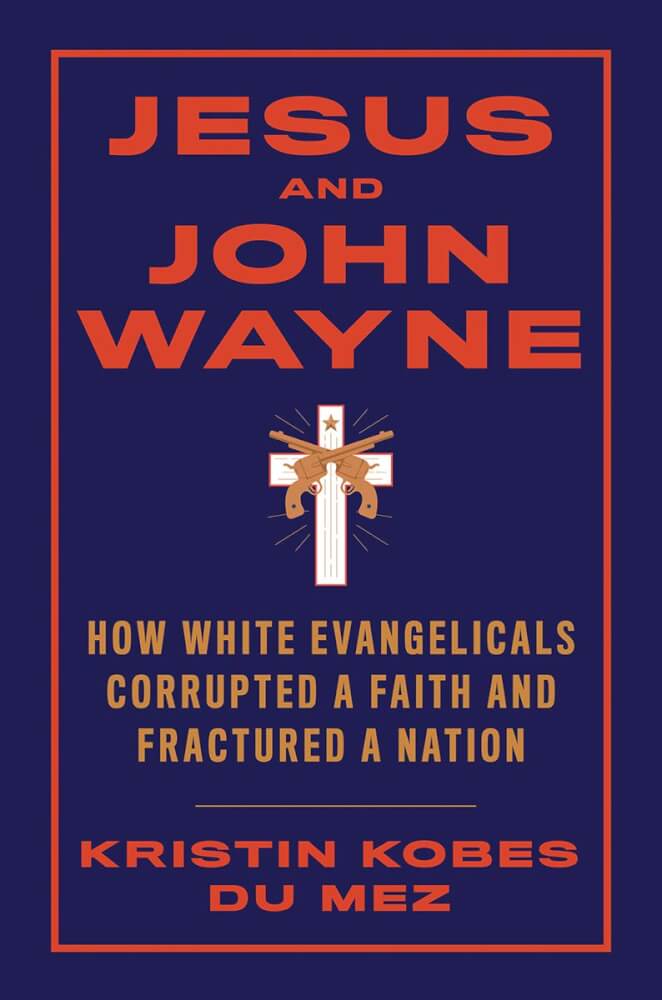 This is a highly disturbing–and informative–book.
This is a highly disturbing–and informative–book.
In an interview with Religion & Politics, the author discusses how she came to its writing:
Yes! Since about 2010, I had been giving talks on evangelicalism and masculinity and had been approached by publishers, but there were two things at that point that made me a little hesitant to dive into a book project. For one, the things that I was uncovering were very depressing. I wasn’t sure that I wanted to live with that for the years that I knew it would take to write a book. For another, I wasn’t sure at first how mainstream it all was. As a Christian myself, I wanted to be careful about shining a bright light on this dark underbelly of American Christianity if it was merely a fringe phenomenon . . . However, just before the [2016] election, things clicked for me. The Access Hollywood tape came out, white evangelical elites continued to defend Trump, his support among white evangelical voters remained strong, and I thought, “Ugh, I think I know what’s going to happen and I think I know why.” That’s when I pulled some of that old research and wrote [a paper] “Donald Trump and Militant Evangelical Masculinity.”
And then the book was published in 2020.
Then May 27, 2021, du Mez published in The New York Times: Kristin Kobes Du Mez: What We Believe About History. In it:
This personal reflection is part of a series called The Big Ideas, in which writers respond to a single question: What do we believe? You can read more essays by visiting The Big Ideas series page.
Beliefs have a history. As a historian of religion, I take this for granted. I’d forgotten how foreign this notion is to many evangelicals in the United States.
Evangelicals identify as “Bible-believing” Christians: Evangelical pastors preach “biblical values,” and evangelical leaders promote “traditional” values in the secular, public sphere, weighing in on issues ranging from tax policy to gun control. All of these beliefs are packaged and sold as biblical, timeless and eternal.
Evangelicals are not alone in considering that their beliefs are eternal and unchanging. For believers of all stripes, the very notion of truth assumes an aura of timelessness, but historical knowledge has a way of complicating such certainty. By revealing not only continuity but also considerable change over time, history demonstrates that much of what passes for traditional is, in fact, of relatively recent origin. By situating historical subjects within broader contexts, history also reveals how economic, political and cultural factors influence what people believe to be true at any given time.
However, to an unusual degree, evangelicals have remained oblivious to how their own stories map onto larger histories. It’s not that evangelicals disregard history entirely, but they tend to prefer their own versions of events. At a popular level, pseudo-historians have played fast and loose with historical evidence to spin fanciful tales of America’s Christian origins. Within academic circles, some evangelical historians have produced narratives that tend to downplay the darker sides of their religious tradition.
For those who have only ever encountered whitewashed portrayals of their own past, a more complex account of evangelical history is enormously disruptive. Evangelicals are shocked, for example, to learn that the Rev. Billy Graham had a decidedly mixed record when it came to civil rights, was politically ambitious, promoted American militarism and tacitly condoned atrocities in Vietnam. This was not the Graham they knew and loved.
History also disrupts simply by showing that things have not always been as they are now. For example, there was a time when many conservative Protestants rejected the very idea of “Christian America.” Those taught that patriarchy is essential to Christian orthodoxy would be surprised to learn of the long history of evangelical feminism.
Evangelicals have also created a vast consumer culture that reinforces an uncomplicated and uncritical self-perception. Christian radio, Christian publishing and Christian school textbooks and home-school curriculums reinforce narratives depicting evangelicals as the good guys, bravely doing God’s work in the world. The nation’s sins — racism, sexism, xenophobia, white nationalism — are depicted not as problems endemic to the tradition, but rather as departures from “true evangelicalism.” Critical outsider accounts are either ignored or discounted as attacks, reinforcing an evangelical persecution complex. Because enormous profits are at stake in this evangelical consumer culture, both financial and ideological motivations play into efforts to keep evangelical consumers within the fold.
American evangelicals have crafted their own historical narratives for many decades. The truth can be deeply disruptive.
Following is a webinar on this book with Kristin Du Mez done by Calvin University where she has taught since 2004:
A link to a wide array of her talks on this overall topic/her book may be found here.
Further, in The Immaculate Mistake: How Evangelicals Gave Birth to Donald Trump (2021) by , we discover:
President Donald Trump originated his political career by claiming that Barack Obama was not born in the USA. His “birtherism” theory was discredited, but there’s another possibility about birth. Evangelicals have given birth to Donald Trump in the immaculate mistake. Evangelicals are not a collection of dumb and irrational people; they are the creators of the demolition presidency of Trump. He is their child–the result of almost one hundred years of evangelical angst, resentment, and hurt. This is the story of how Trump has become a secular evangelical preacher and his message of fear, hatred, division, and getting even has captured the hearts and minds of evangelicals. Rather than dismissing them, this work takes them seriously and literally and offers a frank and disturbing series of portraits of their determination to win at all costs.
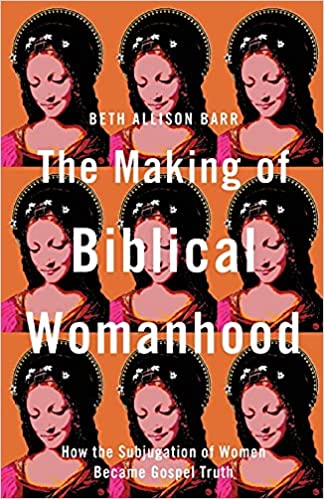 Another historical book was published (April 2021) by Du Mez’ good friend Beth Allison Barr: The Making of Biblical Womanhood: How the Subjugation of Women Became Gospel Truth. My only quibble with the title: “Biblical” should be in quotation marks.
Another historical book was published (April 2021) by Du Mez’ good friend Beth Allison Barr: The Making of Biblical Womanhood: How the Subjugation of Women Became Gospel Truth. My only quibble with the title: “Biblical” should be in quotation marks.
A discussion, led by Doug Pagitt, with the author is below.
You may also read this excellent review by John Turner: Unmaking Biblical Womanhood. His final words:
That’s the power of this book. Complementarianism, even in its softer forms, isn’t just wrong theologically and biblically. It is a heresy that hurts people, practically, emotionally, and spiritually. So, as Beth says, “Stop it!”
In the video discussion below, Barr references Junia–one of several women commended by Paul for their service in Romans 16. She writes:
Junia, I showed them, was accepted as an apostle until nearly modern times, when her name began to be translated as a man’s name: Junias (p. 66).
Another highly significant point not mentioned by Barr is:
Andronicus, Athanasius of Christianoupolis and Saint Junia; Venerated in Eastern Orthodox Church, Oriental Orthodox Churches; Feast May 17, 23 Pashons (Coptic Orthodox); Attributes Christian Martyrdom
Only one record of the male name “Junias” has been discovered in extra-biblical Greek literature, which names him as the bishop of Apameia of Syria. Three clear occurrences of “Junia” have been found. While earlier searches for “Junias” in Latin also yielded no evidence, it is reported that “Junias” has been found as a Latin nickname or diminutive for the name “Junianas,” which was not uncommon both in Greek and Latin. While this is a possibility, historical studies on the name “Junia” as a contracted form of “Junianas” has shown there are over 250 citations of the name Junia in antiquity all of which have been found to refer to women, with not one single case proven to be the abbreviated form of Junianus to Junia.[18] Meanwhile, the name Junia is attested multiple times on inscriptions, tombstones and records; most notably, the half sister, Junia Secunda, of Marcus Junius Brutus.[19] —Wikipedia: Junia
In other words, “Junias” was likely a made-up name because translators could not accept that Paul was designating a woman to be an apostle–especially a “prominent” one.
From her book is this:
I remember feeling like such a hypocrite, standing before my college classroom.
Here I was, walking my students through compelling historical evidence that the problem with women in leadership wasn’t Paul; the problem was with how we misunderstood and obscured Paul. Here I was, showing my students how women really did lead and teach in the early church, even as deacons and apostles. Junia, I showed them, was accepted as an apostle until nearly modern times, when her name began to be translated as a man’s name: Junias. New Testament scholar Eldon Jay Epp compiled two tables surveying Greek New Testaments from Erasmus through the twentieth century.1 Together, the charts show that the Greek name Junia was almost universally translated in its female form until the twentieth century, when the name suddenly began to be translated as the masculine Junias. Why? Gaventa explains:
Epp makes it painfully, maddeningly clear that a major factor in twentieth-century treatments of Romans 16:7 was the assumption that a woman could not have been an apostle.2
Junia became Junias because modern Christians assumed that only a man could be an apostle. As a historian, I knew why the women in Paul’s letters did not match the so-called limitations that contemporary church leaders place on women. I knew it was because we have read Paul wrong. Paul isn’t inconsistent in his approach to women; we have made him inconsistent through how we have interpreted him. As Romans 16 makes clear, the reality is that biblical women contradict modern ideas of biblical womanhood.
I knew all this. Yet I still allowed the leaders of my church to go uncontested in their claim that women could not teach boys older than thirteen at our church. I still remained silent.[The irony of course is not lost: This is precisely what “power over” compels victims to be; in this case with a quote from Paul (seemingly) commanding it!3 Thankfully, Barr now is declaring to the world how wrong it is to keep women silent–and why! She has gloriously broken her silence!] (emphasis added; Barr, Beth Allison. The Making of Biblical Womanhood: How the Subjugation of Women Became Gospel Truth (pp. 66-67). Baker Publishing Group. Kindle Edition.)
Baker Book House brought these two writers together in an April 22, 2021 discussion moderated by New Testament scholar Scot McKnight:
The video is found here: Baker Book House’s You Tube channel. There is also a Facebook upload.
A further article, describing some of the ugliness of Southern Baptist machinations around race–especially nonembrace of Critical Race Theory, the role of women–especially complementarianism, and that one must vote Republican–especially for Trump and his “stolen election” nonsense, is: Secret recordings, leaked letters: Explosive secrets rocking the Southern Baptist Convention.
The Southern Baptist Convention is by far the largest evangelical body in the United States, with about 14 million members. It is the world’s largest Baptist denomination, the largest Protestant[2][3] and the second-largest Christian denomination in the United States, smaller only than the Roman Catholic Church.
It is arguably as well and ironically significantly anti-Christ/anti-Scripture in its ethics. I discovered this personally in 1997 when I was invited to dialogue (Why I Oppose the Death Penalty: “The Talking Place: Discussing the Death Penalty” Forum on the Death Penalty, Fairbanks Alaska, March 22, 1997) with Dr. Richard Land of (later-so-named) “The Ethics and Religious Liberty Commission” of the Southern Baptist Convention. The dialogue was organized by the Presbyterian Church in Alaska because debate was heating up in a state with no death penalty on the books. It was initially billed as a debate. I said I would not attend unless a dialogue. Debates I said for listeners generally only establish a “winner” and a “loser,” little more. So as you may read in the above highlighted post, they used a local Native American way of settling disputes: inviting all to “The Talking Place.” Years later my wife and I discovered an identical process in the Gacaca Courts of Rwanda.
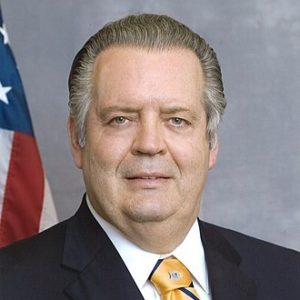 Dr. Land, sadly, went on to become one of the most outspoken American evangelical voices in support of the War on Terror. See his tragic “Land Letter.”
Dr. Land, sadly, went on to become one of the most outspoken American evangelical voices in support of the War on Terror. See his tragic “Land Letter.”
He told me in 1997 he respected that I was at least consistent in my peacemaking perspective upon learning I was anti-war. As I say in the above post:
That Land in this light could ever have written such an incredibly anti-Christ missive as the “Land Letter” shows the continued truth of Jeremiah 17:9, and of our own desperate need for “truth-telling” challenges throughout our lives. John Alexander observed in Your Money or Your Life that it is the rarest fundamentalist who believes that the inspiration of Scripture actually extends to the words of Jesus . . . So it seemed borne out once again in the life of Dr. Land.4
…
Sadly too, Dr. Land’s “teachable moment” was seemingly entirely lost (except in his private thoughts?), and he only subsequently entrenched further in the great triple Christian West heresies of Just War, Just Deserts, and Just Hell of eternal conscious torment. A personal letter to him in response to the “Land Letter” went unacknowledged, unanswered. There is none so blind as they who will not see. (For us all a sobering spiritual truth repeatedly on the lips of the prophets, of Jesus!)5
There is recently this by June 10, 2021: Pressure Mounts for an Independent Investigation of SBC Executive Committee Handling of Abuse. We read:
The chairman of the Southern Baptist Convention’s Executive Committee plans to call for an independent investigation into the committee’s handling of sexual abuse claims when it meets next week in Nashville, Tennessee.
Rolland Slade, pastor of Meridian Baptist Church in El Cajon, California, said he would also support a proposal from two Southern Baptist pastors for an investigation, which will likely be raised during the denomination’s annual meeting June 15-16. “It’s never the wrong time to do the right thing,” he said.
A follow-up story by June 14, 2021, is here: Southern Baptist Executive Committee Hires Guidepost Solutions to Review Moore Allegations.
Still more follow-up by June 15, 2021: SBC Executive Committee Rejects Request for System-Wide Abuse Inquiry. In it we read:
“At the end of the day, I want us to be fully aware that what’s coming out of this room is we can debate nominations but we cannot debate or discuss how we’re going to investigate the way we handle sexual abuse,” said Easler, a pastor from Gaffney, South Carolina. “That’s very, very telling about our situation.”
At the end of the Convention gathering June 15 & 16, 2021 there is this article: Southern Baptists elect Ed Litton as their president, a defeat for the hard right. We read:
The election result [of Ed Litton] is unlikely to end the divisiveness within the convention or satisfy attendees such as Judd Saul, a filmmaker from Cedar Falls, Iowa, who traveled to Nashville because he wanted to warn Southern Baptists of the “drastic slide” into the political left and into CRT and was distributing pamphlets about the “woke SBC.” He said he was kicked out of his Southern Baptist church three years ago for promoting conspiracy theories and now attends a nondenominational church.
“We used to be known as conservative stalwarts,” Saul said. “I miss the SBC. That’s why I’m here to help wake people up and get it steered back in the proper direction.”
…
However, [Litton] reaffirmed his commitment to conservative doctrine Baptists hold dear. Litton, who considers himself a complementarian which generally teaches the headship of men and the submission of women, said he thinks the current Baptist statement on faith is sufficient on women’s roles in the church. (Women are generally forbidden from the lead pastor role in SBC churches.)
The convention, which is known for adopting resolutions on all kinds of political and cultural issues,also adopted resolutions opposing taxpayer funding for abortion and opposing an LGBT rights measure called the Equality Act.
We learn further in Bob Smietana’s (June 17, 2021) Southern Baptists Approve Abuse Task Force, Say Abusive Pastors Should Be Banned that a task force on sexual abuse was approved by delegates. We read:
The task force approved by messengers had a wide mandate.
“Said task force shall ensure that the third-party review includes an investigation into any allegations of abuse, mishandling of abuse, mistreatment of victims, a pattern of intimidation of victims or advocates, and resistance to sexual abuse reform initiatives,” the motion for the task force read.
These are certainly signs of hope.
A further sign is my post, October 27, 2022: Deconstruction or Reconstruction? Pastors Discuss a Reboot of Evangelicalism. It is about another article of the same date by , that features a presentation by Ms. Du Mez. I also include a powerful video presentation, October 26, 2022, by Professor John Millbank, “Most Entanglings: The Trinity as the Root of All Being.”
Please take note though of my commentary in this post: The Christian Right Is in Decline, and It’s Taking America With It.
I add this superb reflection, 10/06/21, from my wise friend Allen Harder–with permission:
Hi Wayne
I recall a year or so ago your highly recommending reading Jesus and John Wayne: How Evangelicals Corrupted a Faith and Fractured a Nation. Last week a friend lent me the book. Here are some reflections.
This week i did a binge reading of the book. Utterly fascinating. Much of the material I had only a passing knowledge of, and this book really filled in a lot of cracks, pardon the mixed metaphor, put a lot of puzzle pieces in place. I wasn’t aware of the extent, and depth of the evangelical right wing coopting the military and politics, as well as the cultural and social influence of their brand of bastardized gospel. Militant masculinity, authoritarian patriarchy and subservient women and sexuality to support an incredibly twisted view of male identity (and of Jesus) and definitions of “society’s ills” has certainly poisoned all that they touch. What is amazing is the marketing machine that they had at their command to influence. One wonders what the drivers of this movement are. That it depends of needing enemies to fuel the fear that they build on, and the need for a masculine, militant male ‘hero’ was clearly elucidated. It’s more prevalent than I had expected. That the groundwork for the rise of Trump was laid already 50 years ago was revealing to me, and that it won’t be going away soon as long as the movement maintains its influence. Now that Biden is in the White House, and that the American military left Afghanistan with failure written large, I wonder what kinds of demons the right wing will conjure up now to foment another militant, or military action to sustain their cause.
One thing that du Mez could have built on was the connection of wealth to the power and sex themes. The leadership that she targets also built wealthy empires. Jim Wallis maintains that the triad of power, wealth and sex is usually unbroken. Power and wealth create a sense of impunity, and when married to militant masculinity, it is not surprising that so many leaders of this movement got so involved with sex scandals. Her second to the last chapter sure nails the coffin lid tight. I was astonished to read about the extent of the culture of violent masculinity and feminine servitude is being marketed and the extent to which it is fomenting a culture of violence. That the pro-Trump rallies are rife with violence is not surprising.
The book has also clarified many of my questions about how evangelicals who believe in Jesus could support such misogyny, violence, racism, anti-feminism, etc. etc. It’s a cultural phenomenon and not a religious, theological one, albeit undergirded by a contorted understanding of religion. It has also clarified for me that the extent of convictions and practices of patriarchal authoritarianism explains why democratic ideals mean nothing to this crowd and that it is pointless to call them out on these ideals. It’s all too clear that religious leaders could endorse the January 6 uprising.I couldn’t help but be reminded of comparison between extreme right-wing evangelicalism and extreme right-wing Islam. The parallels between the masculine militancy, absolute patriarchal authority and subordination of women and sexuality can’t be missed. When I talked to my wife about this, she also drew a parallel. It must be something to do with far right-wing religion, whether it is Christianity, Islam, Hinduism and even Buddhism. The more right-wing, the less tolerance there is of “the other” and the more likelihood of resorting to violence through power. The culture of violence in right-wing Islam and in right-wing evangelicalism seems remarkably similar.
I have a book, Quiet: The Power of Introverts in a World That Can’t Stop Talking, that documents social developments in the early 1900s that created a culture of extroversion and sidelined introverts. Dale Carnegie began influencing America with his messages of what it takes to be successful. It was the beginning of modern marketing, and influenced Americans that one needs to be an extrovert to be successful. The book documents the erosion of 19th-century foundations of virtues, which were displaced by success. It also documents the rise of celebrity-ism and Americans’ fascination with celebrities, and how they became our main influencers. Business schools and educational “wisdom” became more and more oriented to extroverts, to the extent that introverts became sidelined. I also have several books on the challenges introverted church leaders have in a world that exalts extroversion. This development slightly pre-dates the author’s documentation, even though she attributes Roosevelt’s “conversion” to this era as well. Starting her analysis with this era of change could have made contributions to understanding the rise of militant masculinity (which is inherently extrovert), and sidelined a whole population of males (and females) of potential introvert male identity.
A few years ago I was reading books about the neo-Calvinist movement sweeping through the evangelical world (including more conservative Mennonite conferences, including the Mennonite Brethren). John Piper, whom du Mez often refers to, is one in the vanguard of this movement. Anyway, I started wondering what neo-Calvinists, and their steel-clad adherence to the TULIP (Total Depravity, Unconditional Election, Limited Atonement, Irresistible Grace and Preservation of the Saints) doctrine might have in common with Muslim belief. I did some digging around and found a revealing chart that did a comparison of theological approaches. What I found amazing was that their concept of God was remarkably similar—an angry and easily offended tyrant who requires satisfaction and sacrifice and absolute obedience to “God’s Law,” a hierarchical order of authority, a God who is in absolute control of even the littlest aspect of life, and the total depravity of “man” who must be totally obedient to earn a place in paradise and act out to defend God.What astounds me is how little place there is for grace for others. Being convinced that God is unending and unbounded love and grace for all is the only remedy. Amen! And again I say, Amen!
Also, the neo-Calvinist insistence that either you believe in every iota of the TULIP doctrine, or you are apostate. As I was reading Jesus and John Wayne, I couldn’t help but be reminded of comparison between extreme right-wing evangelicalism and extreme right-wing Islam. The parallels between the masculine militancy, absolute patriarchal authority and subordination of women and sexuality can’t be missed. When I talked to my wife about this, she also drew a parallel. It must be something to do with far right-wing religion, whether it is Christianity, Islam, Hinduism and even Buddhism. The more right-wing, the less tolerance there is of “the other” and the more likelihood of resorting to violence through power. The culture of violence in right-wing Islam and in right-wing evangelicalism seems remarkably similar.
What astounds me is how little place there is for grace for others. Being convinced that God is unending and unbounded love and grace for all is the only remedy.
Anyway, enough for tonight. I’m going to send this before I accidentally delete the whole thing.
Cheers
Allen
Yet another story, August 12, 2022,
She adds a little later:
Immersed in these teachings about sex and power, evangelicals are often unable or unwilling to name abuse, to believe women, to hold perpetrators accountable, and to protect and empower survivors (p. 278).
Then there were the multiple sex scandals discussed in the penultimate chapter titled: “Evangelical Mulligans: A history.” One of the first (in 2006) was Ted Haggard, pastor of New Life Church, a megachurch in Colorado Springs. A host of white evangelicals immediately jumped to his defence. Pete Newman of Kanakuk Kamps is serving two life sentences for his serial molestation of boys. C. J. Mahaney of Sovereign Grace Ministries, who had already fallen once from grace and later had been reinstated, had a pall of suspicion cast over him for his enabling of multiple sexual abuses at the church. Only a statute of limitation prevented him from being prosecuted.
In 2014, Bill Gothard stepped down from his Institute of Basic Life Principles after more than 30 accusers, some minors, reported molestation and sexual harassment. Doug Phillips stepped down from his Vision Forum Ministries after a lengthy extramarital affair. It was all indeed a series of very sordid affairs . . . Others such as Josh Duggar of the TV reality show 19 Kids and Counting molested four of his sisters.13 Father and son Jack and Dave Hyles, the father a pastor in the Independent Fundamentalist Baptist movement, were involved in molestation of women. The replacement pastor after the father’s death was Jack Schaap. A cult-like culture of sexual abuse was eventually discovered, including pedophilia, sexual molestation, rape, and the abuse of children.
Then when the #MeToo movement came to American evangelicalism, Andy Savage of a Memphis megachurch admitted to sexual assault of a former teen while he was youth minister. He eventually resigned. Then Bill Hybels of Willow Creek megachurch fame (and multiple copycats) had seven women come forward accusing him of sexual misconduct and abuse of power.
At least 187 Independent Baptist Churches were caught up in allegations of sexual misconduct.
Then the Southern Baptist Convention (SBC) was hit by allegations of covering up sexual abuse and of sexual abuse, implicating highly-placed ministers Paige Patterson and Darrell Gilyard. Further extensive patterns of sexual abuse by as many as 380 perpetrators with at least 700 victims came to light within the SBC.Immersed in these teachings about sex and power, evangelicals are often unable or unwilling to name abuse, to believe women, to hold perpetrators accountable, and to protect and empower survivors. (p. 278)
A veritable volcanic eruption of sexual abuse cases was engulfing white evangelical churches.
A “mulligan” in golf is another chance at a flubbed shot. White evangelicalism was positively rife with the phenomenon—redemption however absent confession, repentance, making amends, and commitment to “go and sin no more.” The penultimate chapter is powerful understatement of the travesty of white evangelical mulligans offered as cover and cover-up ubiquitously within a culture of sick militant Christian masculinity.
Du Mez makes clear again in the final chapter that
. . . evangelicalism must be seen as a cultural and political movement rather than as a community defined chiefly by its theology (p. 298).
For all Billy Graham’s iconic thundering “The Bible Says! . . .” fifty years ago, indeed fully 70 plus years earlier, “frankly Scarlet (and Franklin—and a vast array of others of your ilk), white American evangelicals don’t give a damn . . .” Theirs is a studied footnote, exception clause (“except our enemies”) theology in response to John 3:16 that à la W.C. Fields has ever sought and come up with “the loopholes.” Seek and ye shall find, indeed.
Du Mez comments near the book’s end:
For many evangelicals, the masculine values of men like John Wayne, William Wallace, Ronald Reagan, Rush Limbaugh, Jordan Peterson and Donald Trump embody have come to define evangelicalism itself (p. 301).
The author ends on a hopeful though tenuous note:
What was once done might also be undone (p. 304).
. . . evangelicalism must be seen as a cultural and political movement rather than as a community defined chiefly by its theology (p. 298).
The above story is one of great malaise and evil-doing within white American evangelicalism. “Evangelical” in name, the author repeatedly points out that such white evangelicals largely showed little allegiance to the Jesus of the Gospels, rather to a Jesus of hyped-up toxic masculinity. Which came first in importance: Jesus of the Gospels or a culture of fear à la “Jesus” of toxic masculinity—without reference to the Gospels? If you have read this far, you know the author’s answer.
Still, the book would not have been written had the author not become convinced that this “Jesus” had gone mainstream. Crawling through the venomous swamps of such evangelical landscapes, du Mez indicated as we saw that she had not wished to do such research if it represented only a kind of lunatic fringe. In fact, the fringe repeatedly became the mainstream, as so often is the case in any kind of extremism.
Reading the book, then writing a detailed book report produced in me repeated profound revulsion. In part, this must be due to my own growing up white evangelical—albeit Canadian—but well within the gravitational pull of the (GOP) elephant on Turtle Island to the south. It also occasioned the general observation that kick-ass Christianity ineluctably only served to produce an endless crop of buffoonish jackasses à la Trump. But not just buffoons to be laughed off the stage. Rather, horrifically sick puppies capable of doing/guilty of perpetrating profound evil not just within their own tribe, but to America, by extension the world.
Though details and interpretation can no doubt be disputed, Du Mez has produced a superbly researched study, and more so, one with great wisdom to heed.
I write this November 3, 2020. At the end of this day, will there (again) be horrified gasp, or (supercharged) relieved exhalation? For Trump not only did not “drain the swamp,” he engulfed rather America and the world in a vile tsunami of toxic quagmire filth that I in my nearly seventy-two years never before even came close to experiencing. As many have indicated: Trump not once properly responded to the pandemic; he was rather a whole pandemic of the first order unto himself, one for five years foisted upon America and the world.
In Less Than Conquerors: The Evangelical Quest for Power in the Early Twentieth Century (former subtitle: How Evangelicals Entered the Twentieth Century), theologian Douglas W. Frank tells the back story to Du Mez’ back story. Though details and players differ, it’s really the same sad tale. In the second last paragraph of the book, Frank writes:
Whether in auspicious or declining times, as we have seen, we [evangelicals] display a tenacious commitment to self-deceit. It is true that we are those who like to think we heed Jeremiah’s words: “Blessed is the man who trusts in the Lord.” Our history, however, gives evidence rather of Jeremiah’s wisdom in adding these words: “The heart is deceitful above all things, and desperately corrupt; who can understand it?” (Jer. 17:7, 9). In our very protests of trust in the Lord, we find occasion for our deepest self-deceits (p. 278).
These identical words could also sum up the book under review.
In Captain America and the Crusade Against Evil: The Dilemma of Zealous Nationalism, authors Robert Jewett and John Shelton Lawrence also present a masterful study along similar lines to the above. They however take us to the back story behind the above-noted two back stories, all the way to the War of Independence and the Founding Fathers.
The authors state that there is deep biblical rootedness in two contradictory strands of American culture, evident from the beginning.
The first tradition is what we call zealous nationalism. It seeks to redeem the world by destroying enemies (p. 8).
They point out:
The phenomenon of zeal itself provides a fascinating access to the inner workings of our national psyche: the term itself, as we shall see, is the iblical and cultural counterpart of the Islamic term jihad (p. 8).
Then,
Alongside zealous nationalism runs the tradition of prophetic realism. It avoids taking the stances of complete innocence and selflessness. It seeks to redeem the world for coexistence by impartial justice that claims no favoured status for individual nations (p. 8).
No “American exceptionalism” in other words, a term first coined in the early 19th century by French American cultural observer Alexis de Tocqueville.
The authors acknowledge that these two strands have coexisted in “uneasy wedlock” in earlier times, but in a time of worldwide militant jihad, zealous nationalism everywhere must be let die.
Our conclusions are that prophetic realism alone should guide an effective response to terrorism and lead us to resolve zealous nationalist conflicts through submission to international law; and that the crusades inspired by zealous nationalism are inherently destructive, not only of the American prospect but of the world itself (p. 9).
All these authors write from within American evangelicalism. All make meticulously researched, compelling, cases. All in their conclusions are ignored by the vast swath of white American evangelicals . . .
I once gave a lecture to first-year students at Regent College, a seminary affiliated with the University of British Columbia, Canada; one of evangelicalism’s academic finest. The topic was a nonviolent reading of the atonement. An expanded version may be found here, titled: “The Cross: God’s Peace Work – Towards a Restorative Peacemaking Understanding of the Atonement”; a chapter also in Volume One of Justice That Transforms; and in Stricken by God?: Nonviolent Identification and the Victory of Christ. Two Regent profs gave responses. The moment they each pegged the lecture to be merely a subset of pacifism, it was written off . . .
If Jewett and Lawrence are right that (white evangelical) American zealous nationalism is “the biblical and cultural counterpart of the Islamic term jihad”; if Frank is right that (slightly changed) “In white American evangelicals’ very protests of trust in the Lord, they find occasion for their deepest self-deceits.,” then perhaps those Regent profs, and a vast array of (white) North American evangelicals, in light of the book reviewed and the other two cited, should be enjoined to think again—just a little bit harder. Indeed, perhaps think again—for the very first time . . .
For the PDF of the above review, click on: Jesus and John Wayne.

